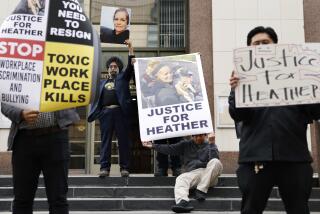Inspectors Challenge Washington Over Weapons Evidence
- Share via
UNITED NATIONS — The top U.N. weapons inspectors challenged the United States over Iraq on Friday, declaring that 577 inspections over the last 11 weeks have failed to confirm Bush administration claims that Saddam Hussein’s regime is actively hiding or developing chemical, biological and nuclear weapons.
In a tense meeting of the U.N. Security Council, Hans Blix and Mohamed ElBaradei repeatedly contradicted or questioned a presentation of satellite photos and other intelligence last week by Secretary of State Colin L. Powell.
Their reports, emphasizing recent progress and stressing plans to expand inspections, appeared aimed at Washington as much as at Baghdad.
Powell, in response, put aside his prepared comments to make an impassioned appeal to the bitterly divided Security Council to recognize that military force may now be necessary -- “as distasteful as it may be, as reluctant as we may be” -- to compel Iraq to disarm.
Powell ridiculed Baghdad’s creation this month of two commissions to assist the inspectors, as well as a new Iraqi decree, announced just before the council met Friday, that officially bans weapons of mass destruction.
“These are all tricks being played on us,” he warned.
If Baghdad was serious about its claims of complete disarmament, Powell added, “documents would be flooding out” of Iraqi factories and facilities, and weapons experts “would be lining up” to be interviewed by U.N. inspectors.
“This is not brain surgery,” he said.
But the inspectors’ latest reports provided little support for U.S. positions. ElBaradei, director-general of the International Atomic Energy Agency, said his experts have “found no evidence of ongoing prohibited nuclear or nuclear-related activities in Iraq.”
In a sharp departure from U.S. views, ElBaradei even argued that Iraqi cooperation might not be necessary. His agency’s experience, he said, “shows that it is possible, particularly with an intrusive verification system, to assess the presence or absence of a nuclear weapons program ... even without the full cooperation of the inspected state.”
Blix, who heads the U.N. Monitoring, Verification and Inspection Commission, was highly critical of Iraq when he last reported to the Security Council, on Jan. 27. His latest report at times seemed more complimentary toward Baghdad than toward Washington.
Blix declared for the first time, for example, that inspections “are effectively helping to bridge the gap in knowledge that arose due to the absence” of U.N. inspectors from Iraq between December 1998 and last November.
“The situation has improved,” Blix said, citing several signs that he said suggested Baghdad has increased its cooperation.
In contrast, Blix directly challenged some of the dramatic evidence that Powell presented to the Security Council last week to bolster the U.S. case that Iraq remains in material breach of U.N. resolutions.
Intelligence has “limitations,” Blix warned, and “misinterpretations can occur.”
Powell charged last week, for example, that Baghdad had removed weapons or other evidence from nearly 30 sites shortly before inspectors arrived to search them. He described an elaborate Iraqi system, directed by Saddam Hussein’s son Qusai, to conceal weapons and deceive the inspectors.
But Blix said his inspectors had conducted unannounced searches of industrial sites, ammunition depots, research centers, universities, presidential palaces, private homes, missile production facilities, military camps and farms.
“In no case have we seen convincing evidence that the Iraqi side knew in advance that the inspectors were coming,” he said.
Blix confirmed reports that U.N. missile experts have concluded that recent tests of Iraq’s Al-Samoud 2 missile show it can fly more than 93 miles and thus is in violation of U.N. rules imposed after the 1991 Persian Gulf War. Newly built casting chambers to produce motors for the missiles are also illegal, he said. He did not say whether inspectors would attempt to seize and destroy them.
But Blix did not support Powell’s claim that a new missile test stand is also illegal.
Powell had highlighted the 92-foot-long test stand at Al Rafah last week as clear evidence that Iraq is seeking to build a long-range missile in defiance of U.N. resolutions.
“So far, the test stand has not been associated with a proscribed activity,” Blix said.
Blix also took issue with one of Powell’s more powerful pieces of evidence -- a pair of before-and-after satellite photos of Iraq’s Taji munitions facility. Powell said last week that U.S. intelligence analysts “know” that Taji was used to store chemical weapons but that decontamination trucks, security tents and other suspect equipment were removed Dec. 22, just before inspectors arrived to search the site.
Blix said his analysts saw the situation differently.
“The reported movement of munitions at the site could just as easily have been a routine activity as a movement of proscribed munitions in anticipation of imminent inspection,” he said.
Blix conceded that one intelligence tip -- reportedly from Washington -- led inspectors last month to a scientist’s house where they found 2,000 pages of documents about laser enrichment of uranium.
“In other cases, intelligence has led to sites where no proscribed items were found,” he added.
Blix said the U.N. will deploy American U-2 spy planes over Iraq next week to support the inspectors. The world body also plans to soon use French Mirage IV surveillance aircraft, German reconnaissance drones and Russian Antonov planes with night-vision capabilities.
Among other things, he said, the fleet of high-tech aircraft will search for evidence -- again cited by Powell -- of mobile biological weapons production units.
Meeting reporters later, Powell denied that Blix had contradicted or undermined U.S. claims of Iraqi intransigence.
“I don’t think Dr. Blix challenged a great deal,” he said.
More to Read
Sign up for Essential California
The most important California stories and recommendations in your inbox every morning.
You may occasionally receive promotional content from the Los Angeles Times.














